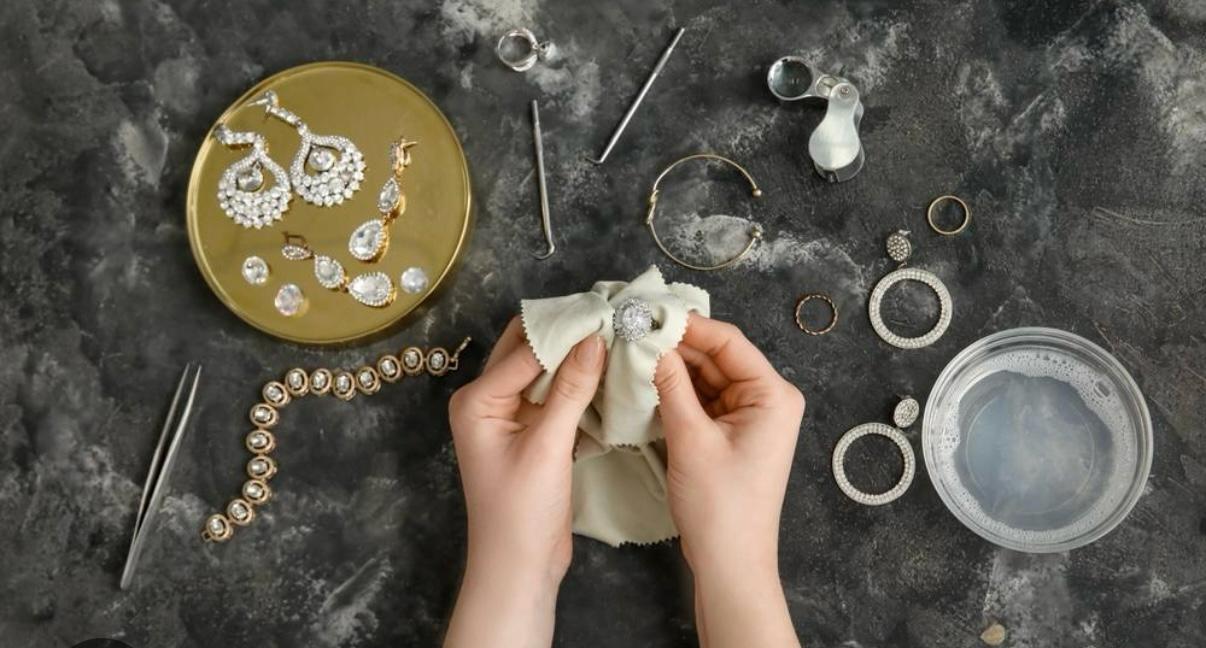Any idea when the last time you cleaned your ring and or jewelry? Keeping a watchful eye on when you clean your jewelry will enhance the longevity of your wear. It’s like keeping up with your cars oil change or yearly physical. It keeps is nice a sparkling as well as catching anything that could occur down the line. But just don’t jump to any recommended cleaning that you see online. There are correct cleaning solutions as well as techniques.
Look out for here says and old wives tales on cleaning your jewelry. Many methods are out there, but keep an eye out for what and how you use anything cleaning wise for your precious bling.
1. Toothpaste Scrubbing
Obviously, great for your pearly whites but not necessarily great for your jewelry. Using toothpaste can do more harm than good. It’s abrasive and can scratch the gold and/or loosen the stones.
And don’t forget that toothpaste is corrosive to the metal. Specifically, keep toothpaste away from pearls and opals. It will cause them to lose their color and shine.
2. Soak in Lemon Juice
This is a classic old wives’ tale that’s been a DIY solution. Please do not use this to clean your jewelry.
Lemon juice tends to be very acidic and abrasive. The acidity in lemon juice will tarnish, discolor and scratch your jewelry.
Avoid at all costs cleaning your pearls with lemon juice. Pearls are fragile and the acidity might even disintegrate your pearls if soaked in lemon juice.
3. Boiling your Jewelry
This actually sounds much better than the previous two and thats because jewelers use steam to clean jewelry. Even though stones like emerald and opals shouldn’t be steamed because it might cause cracking.
By soaking your jewelry in boiling water, that can weaken and misshape your jewelry. A quick dip may not affect it much, but avoid dipping with your softer and thinner pieces.
4. Using Bleach
This method might be able to remove a wine stain but not anything jewelry related. Bleach is made up of harsh chemicals that can break down the metals in your jewelry. This can cause permanent damage and discoloration.
Chlorine in swimming pools and spas are best to avoid being since chlorine can slowly break down the finish and polish of most gemstones.
Depending on how much damage occurs, soap and water can counteract the effects of chlorine. But is the risk worth taking? Stay away from bleach and chlorine.
5. Shower Time
We are all guilty of stepping into the shower with some or all of our jewelry. You might be getting a good scrub, but your jewelry isn’t. It’s actually getting dirtier as it collects all the soap scum.
Jewelry types in 14k gold, some grades of steel and titanium can survive. But others won’t.
If you like your hot showers, it’s possible for any adhesives that might be there holding things in place to get damaged. Hard water also damages soft jewelry.
Best to take off your jewelry while in shower and put back on after lotions and sprays have been applied. And the chemicals from your sprays can cause harm due to the chemicals and oils they possess.
6. Using Vinegar
Although a popular choice, vinegar like lemon juice is very acidic and can cause damage to your soft plated jewelry and soft stones. Soaking jewelry in vinegar will remove and shine and finish your jewelry may have. If you have made any of these mistakes, it’s not to late to update your jewelry!
7. Baking Soda
This is very abrasive and too alkaline. It can scratch softer metals and stones alike. Matter of fact, just like lemon juice and vinegar, baking soda is just as damaging.
8. Not knowing your jewelries DNA
Not all jewelry is alike. While some can handle certain cleaning methods, others can’t. By not knowing what the material is, it can cause irreversible damage.
In a lot of cases, inexpensive jewelry requires delicate handling. Although the same can be said for expensive or delicate jewelry.
When making a purchase, be sure to know what materials are being used and ask what’s best for cleaning those pieces. In a lot of cases, you might have coverage that allows for free cleanings.
9. Are you overfishing or under washing
Many jewelers claim that a 3 minute cleaning is all you need. That maybe the case if they have some serious equipment, but would you take a 3 minute shower and expect to be very clean? We suggest leaving it overnight soaking for the best result. This ensures the diamonds have proper time to get cleaned.
For your platinum and gold jewelry, be careful of cleaning too often. Professionally polishing will actually remove very fine amounts of metal each time. Every so often works well but try not to go overboard.
10. Jewelry Cleaner
This is a great way to clean many of your jewelry pieces. Again, there are some metals and stones that you should stay away from while giving them a wash.
Any jewelry that is not made of 10k, 14k, 18k gold or platinum into jewelry cleaner will contaminate the cleaner. Once this occurs, the contaminated solution will easily tarnish.
And whatever you do, please do not use jewelry cleaner to clean your pearls. This will remove the pearl’s luster.
While avoiding these Cleaning Mistakes
All you really need is some good ole Mr. Detergent in the blue form mixed in with some water. Rubbing alcohol seems to be a great diamond cleaner as well.
Don’t risk cleaning your jewelry with any of the above 10 points. Make sure your consultant goes over any of these when you are uncertain.


